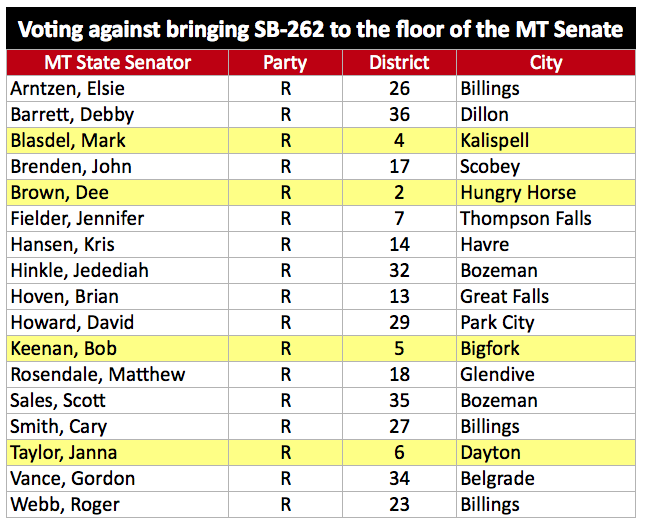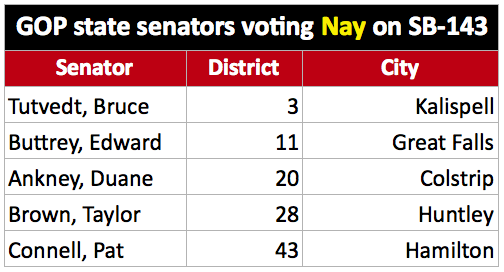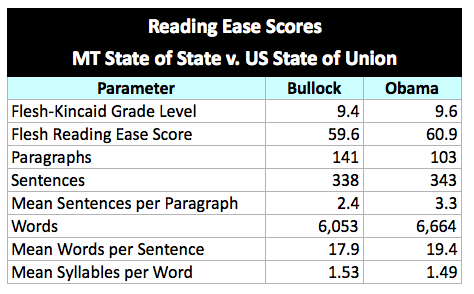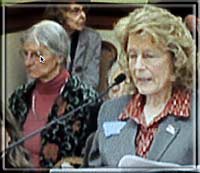CSKT compact, SB-262. It passed the MT Senate 31–19. Opponents in the MT House will try to kill it by bottling it up in committee, and attaching poison pill amendments. I suspect it will reach the floor only through a blast.
Senate supporters of the bill seemed surprised by concerns that the compact might lower the level of Flathead Lake during the summer boating season. Having spent years dealing with the issue of summer lake levels, I wasn’t. The compact won’t affect Flathead Lake’s levels, which are governed by the federal license for Kerr Dam. The reserved water rights compact commission should publish a short paper explaining the difference.
Sen. Fielder’s special interest paid aide. Montana Cowgirl has a good post on this situation, which was uncovered by the Bozeman Chronicle. This situation never should have developed. Fielder displayed remarkably poor judgment, and she’ll be fortunate if she escapes formal sanctions for her behavior.

Sen. Jon Tester should stop talking about logging until he gets his fury over litigated timber sales under control. Talking to Montana Public Radio a few days ago, he wrongly alleged that every national forest timber sale in Montana was tied up in litigation. After he was called on that untruth, he tried to weasel with statistics instead of issuing a contrite, handsome, unqualified apology for getting it wrong.
That earned him a scathing column by George Ochenski, a 4-Pinocchio whopper of a mistruth certification from the Washington Post, and some wry poetry at 4and20Blackbirds.
This wasn’t the result of poor staff work, or having been misinformed by the agency. It was the result of Tester’s personality and natural resources philosophy.
I record the votes for bills in a private database I designed. Here’s an updated Excel spreadsheet of how our senators voted on the blast and second and third readings of SB-262.
Earlier. SB-262 was approved 31–19 yesterday on its second reading in the senate. Twenty Democrats and 11 Republicans voted Aye, while one Democrat (Gene Vuckovich, Anaconda) and 18 Republicans voted Nay. Three who voted to blast the bill out of committee (Rick Ripley, Frederick Moore, and Vuckovich) cast Nays on the second reading, while one who voted against the blast (Brian Hoven, R-Great Falls) voted Aye. Three poison pill amendments were rejected. The third reading is today. It will pass.
Bigfork Republican Sen. Bob Keenan sought assurances that approval of the compact would not change the level of Flathead Lake. Sen. Chas Vincent, SB-262’s sponsor, wasn’t able to provide a definitive answer, but I can. It won’t. The Federal Energy Regulatory Commission’s license for Kerr Dam authorizes filling the lake to 2893 Somers Datum, and a number of agreements control when, how high, and how fast the lake is raised or drawn down. The issue is important to boaters, who still remember the abnormally low summer lake levels in 2001 (hydrograph) when keels scraped the bottom at some docks. The CSKT are taking ownership of Kerr Dam (which will be renamed), and will have every incentive and obligation to maintain the current regimen of lake levels.
In my judgment, much of the opposition to the compact is philosophical, not practical. In particular, the time immemorial off-reservation instream flows have struck a nerve with some people, who evidently regard the flows as a de facto expansion of the CSKT reservation and part of a tribal irredentist campaign to oust white people from western Montana. This fear of irredentism, based in part I think on occasional over-the-top rhetoric issuing from CSKT members, is so powerful that it impairs the rational faculties of those holding it.
Updated, 27 February. The report’s cover page is a State of Montana letterhead bearing an impressive title: Proposed 2015 CSKT Compact: Analysis of Potential Impacts to Off-Reservation Water Users. Dated February, 2015, it’s a pretty good analysis of the practical impacts of the time immemorial instream flow rights the compact grants to the CSKT that have two of Flathead County’s commissioners so exercised.
Update. The author’s name has been added to the report, and the locks on the PDF, which were not intentional, have been removed. But the PDF is still SECURED and its metadata cannot be accessed by search engines such as Google.
The CSKT water compact has the votes to pass the MT Senate. The proof came on a 33–17 vote to blast SB-262 out of committee and onto the floor of the senate. Some news stories report the second reading could occur on Wednesday, 25 February, but so far the bill isn’t listed on the senate’s agenda.
Flathead senators Mark Blasdel, Dee Brown, Bob Keenan, and Janna Taylor voted against bringing the bill to the floor, while Bruce Tutvedt, a strong supporter of the compact, voted for the blast.
Today’s skirmish in the Senate’s finance and claims committee revealed the strategy of the compact’s opponents: load up SB-262 with poison pill amendments that the CSKT will (rightly) refuse to accept if somehow an amended SB-262 is approved by the legislature. In the MT House, look for the toxic amendments to come in the appropriations committee.
Below, the Republicans who voted to kill SB-262, and who evidently want Montana to suffer years of expensive and divisive litigation that most assuredly will be decided in favor of the CSKT. These are the MT Senate Republicans who don’t know a good deal when they see one.

Some 20 years ago, I paid $50 for a Samyang 500mm f/8 catadioptric lens, probably a Maksutov design. Photographers sometimes call these reflex lenses, but catadioptric, meaning a combination of mirrors and refracting lenses, is a more precise term. Catadioptric lenses are popular with astronomers, but not with photographers due to fixed apertures, annular bokeh, low contrast, and modest resolution. They’re light and compact, but getting a sharp image handheld is a matter of luck, not skill.
Because I have a 470mm f/7.1 prime lens/teleconverter combination, my Samyang has stayed in its rich brown leather case. But on a whim this morning, I took it out and, handheld, shot a birdhouse approximately 100 feet away. Luck was with me. I wouldn’t call the image tack sharp, but it was sharp enough to resolve the “District 5” lettering.
Here’s another reason so many Montanans find a closed primary anathema: it requires registration by political party — and belonging to what your employer considers the wrong party could get you fired or denied a deserved promotion.
Alina Tugend of the New York Times explains:
…if you’re a nonunion private employee, your boss has great latitude to control your political actions. As Lee Tien, a lawyer with the Electronic Frontier Foundation, put it, “You don’t have the right to speak freely in the workplace.” Or even outside it.
♦ ♦ ♦ ♦ ♦
For private employees, who account for about 85 percent of the work force, the First Amendment’s guarantee offers no protection from being fired for something you’ve said, either in the workplace or outside of it, as on social media. That’s because the amendment addresses actions by the government to impede free speech, not by the private sector.
I think this is a major reason why so many voters identify themselves as independents when we know that most of them actually have distinct partisan leanings. They’re aware that a hyperpartisan employer can obtain voter registration lists easily and use them to determine the political affiliation of an employee or applicant for a job. Doing so might be dubious legally, but there’s no practical way to prevent it from happening. An employer, or his stooge, could simply purchase the voter list after filing for office.
Registering as an independent eliminates that risk, but deprives the voter of a voice in the primary, leaving the selection of the candidates to the most partisan and left or right leaning of the voters. That produces further polarization, which is what the advocates for a closed primary really want.
An open primary protects voters from vindictive employers.
Losing a libel trial can bankrupt a man. But being convicted of criminal defamation can get him fined, tossed in jail, or both. Montana is one of 17 states that still have criminal defamation laws on their books — and until 1996, not even truth was an absolute defense in the Treasure State. The defamatory material had to both true and “…communicated with good motives and for justifiable ends.”
Jane Kirtley, Silha Professor of Media Ethics and Law at the University of Minnesota’s School of Journalism and Mass Communications, placed Montana’s criminal defamation law in historical context in an article in the American Journalism Review in 1996:
That means the bill, SB-262, heads to the Senate’s floor for the second reading. The margin suggests that Republican opposition to ratifying the compact may be weakening.
If convicted of criminal defamation, Lenio could be fined $500 and sentenced to six months in the county jail for having said something the government decided wasn’t nice. Here’s Montana’s criminal defamation statute in its entirety:
Can you expand “Eat and drink nutritious, low calorie foods,” into a 150-word paragraph without changing the meaning of the original seven-word sentence? That feat is beyond my ken, but easily within the range of the pleonastic authors who wrote (and wrote and wrote and wrote) the 571-page Scientific Report of the 2015 Dietary Guidelines Advisory Committee. They managed not only 150, but 168 words:
Humans require a wide range of essential micronutrients and macronutrients for normal growth and development and to support healthy aging throughout the life cycle. Essential nutrients, including most vitamins, minerals, amino acids and fatty acids, water and fiber, must be obtained through foods and beverages because they cannot for the most part be endogenously synthesized, or are not endogenously synthesized in adequate amounts to need recommended intakes. Understanding the extent to which the U.S. population and various age, sex, and racial/ethnic groups within the population achieve nutrient intake requirements through available food and beverage intake, including foods and beverages that are enriched or fortified, is an important task of the DGAC. Notably, the DGAC considers that the primary source of nutrients should come from foods and beverages. Nutrient-dense forms of foods (those providing substantial amounts of vitamins, minerals and other nutrients and relatively few calories) are recommended to ensure optimal nutrient intake without exceeding calorie intake or reaching excess or potentially toxic levels of certain nutrients. [Page 74, line 4.]
Time to put those nutritionists on a word diet.

Two bills that will improve Montana’s ability to keep invasive aquatic species, such as the zebra mussel pictured at left, out of the state will be heard in the MT House’s natural resources committee tomorrow, beginning at 1500. Both bills are sponsored by Rep. Mark Noland (R-Bigfork).
Noland is one of three Flathead representatives on the natural resources committee. Rep. Ed Lieser (D-Whitefish) and Rep. Keith Regier (R-Kalispell, HD-4) are the others.
HB-525 establishes a $10 million trust fund for dealing with aquatic invasive species. The principal can be spent only under extraordinary circumstances. The annual earning will be distributed as grants for invasive species management:
Section 3, (4). In making grant and contract awards under this section, the department of natural resources and conservation shall give preference to local governments, collaborative stakeholders, and community groups that it determines can most effectively implement programs on the ground.
HB-553 makes it possible to authorize a wide range of governmental entities to establish stations that can check boats and trailers for invasive species. If the zebra mussel, or its cousin, the quagga mussel, ever become established in a lake, dislodging it is pretty much impossible. So the best defense is making sure that out-of-state boats and trailers are not carrying the little critters.
More information of the zebra and quagga mussels is available on the website of the Flathead Lakers.
These are good bills that should be passed. You can use the online messaging form to urge the committee to approve them.
Last year, the federal government made the painkiller hydrocodone a Schedule II drug. It can no longer be refilled. Those needing it must first see a physician and obtain, according to some sources, a written prescription. That deliberate inconvenience is intended to discourage the use of opioids — and it’s working. According to the Washington Post, veterans are suffering because it’s become so much more difficult to obtain hydrocodone. And it’s affecting more than just a few:
Half of all returning troops suffer chronic pain, according to a study in the June issue of the Journal of the American Medical Association. So a new generation of pain doctors is pushing for alternative ways to help veterans cope with chronic pain. Some alternatives are acupuncture, bright light therapy and medical marijuana. As part of a $21.7 million initiative with the National Institutes of Health, [the] VA is looking for therapies that could substitute for opioids.
Acupuncture? That’s quackery. Bright light therapy? Some think that’s an effective treatment for acne. But will it kill the pain of an amputation? Medical marijuana? Smoking it might dull the pain of war wounds, but what will dull the pain of the lung cancer caused by smoking the weed?
Moving hydrocodone to Schedule II was a terrible decision, a cruel decision, the triumph of anti-opioid zealotry over compassion for those in pain. It’s a policy with roots in a strain of religion holding that treating pain deprives the afflicted of the opportunity to earn the grace of God by enduring their suffering with dignity.
There is no dignity in suffering. There is only suffering. And where there is suffering because opioids have been denied, there is sin. Official sin. Government sin.
A story of the hometown boy gets arrested genre, published on the Grand Rapids page of Michigan Live this morning, reports Lenio moved from Grand Rapids to Kalispell a couple of months ago.
So far, all news stories report that Lenio did not make specific threats. What seems to have spooked authorities is the frequency and intensity of his posts on his Twitter account. The Daily InterLake’s account is typical:
With school out on Monday for President’s Day, [Kalispell chief of police] Nasset said that a more serious situation likely was avoided. Lenio’s alleged threats didn’t target specific schools or students, but contained strong language. Lenio’s social media accounts appear to have been taken down.
“The message that he was sending out was about killing people,” Nasset said. “He was primarily focused on grade-school children and Jewish people.”
On Tuesday, police were wrapping up an investigation that included a mental evaluation of Lenio. Nasset said that it was “unclear what his ideology was” during interviews.
One interpretation of the situation is that a vigilant citizen and fast acting law enforcement authorities averted a school massacre. But another is that a loud and chilling cry for help was answered by a law enforcement led intervention that amounted to protective detention. There’s more glory for the vigilant and the constable in the former explanation, but perhaps more truth in the latter.
Updated. A Kalispell man, David Joseph Lenio, was arrested on 16 February and charged with malicious intimidation for allegedly making online “generic” threats of violence against local schools. Reports the Flathead Beacon:
The Kalispell Police Department received information at about 11 p.m. on Feb. 15 about “generic threats of violent” directed towards schools via social media.
Although the information posted did not mention specific schools, times, or locations, schools were notified about the threats as a safety precaution, Nasset said.
My initial reaction, reinforced by a 30 December 2014 Tweet that Lenio may have posted, was that the authorities were over-reacting. But a report published today by the Southern Poverty Law Center says there may be many more Tweets involved, and that some are thought to be worded more ominously than the Tweet I found:


Generally, yesterday’s hearing on SB-262, the bill to ratify the water compact with the Confederated Salish and Kootenai Tribes, was conducted competently. But during the question and answer session, Committee Chair Scott Sales (R-Bozeman) twice exercised what I thought was poor judgement.

Sen. Fred Thomas (R-Stevensville) seems to think so. His bill, SB-206, would tighten the eligibility rules for food stamps (Supplemental Nutrition Assistance Program; SNAP) to make it harder for childless, able-bodied adults to qualify for the federally funded program.
And at least initially, he wanted to force food stamp recipients to buy only foods the government decrees as healthy:

Montana’s governor gets around the state, and sometimes to cities like Denver or Seattle, in a Beechcraft King Air twin turboprop aircraft. With good short field performance, a 1,500-mile range, and an almost 300 mph cruising speed, it’s an ideal aircraft for moving the governor promptly and efficiently. Every part of the state is less than two hours flying time from Helena. The 500-mile flights to Seattle and Edmundton are two-hour trips, and the 600-mile flight to Denver is only 30 minutes longer.
For people who believe the governor’s time is valuable, and who believe that travel by air is safer than travel by automobile, the governor’s traveling by King Air is a virtue and a no-brainer.
But for freshman Rep. Brad Tschida (R-Missoula), the governor’s airplane is a $ 1,650 per hour boondoggle. He believes it would be cheaper if the governor traveled by commercial airliner or chartered aircraft, and to places such as Butte, by a state motor pool automobile. Therefore, he convinced the Joint Appropriations Subcommittee on General Government to strip from the state’s budget $662,000 for operating the governor’s aircraft.
Former Republican state legislators Verdell Jackson, Jerry O’Neil, and Derek Skees led a group of Flathead residents who traveled to Helena on 16 February to testify against SB-262, Sen. Chas Vincent’s bill to ratify the water compact with the Confederated Salish and Kootenai Tribes. Other prominent Flathead Republicans testifying against the bill included Flathead County Commissioner Phil Mitchell, Mike Hebert, who lost to Albert Olszewski in the HD-11 primary in 2014, and Clarice Ryan, a conservative from Bigfork who has considerable experience promoting conservative causes.
Because time in the 4.5-hour hearing ran short, only Jackson was able to present arguments against SB-262. His Flathead colleagues were allowed only to state their names and say “I oppose this bill.”
Supporters of SB-262 emphasized how much the renegotiated compact differed from the compact that the 2013 legislature refused to approve. Opponents of the compact claimed the changes were minuscule and of no consequential difference. That’s no surprise. But while the differences may not be as sweeping as Vincent claimed, they are significant and should be important enough to give legitimate political cover to 2013’s naysayers who want to change their minds.
Additional information on the compact is available on the legislature’s website.
Montana Rally for Public Lands. Tomorrow, advocates of keeping federal lands in federal hands will gather in Helena under the Capitol’s rotunda at high noon to make their voices heard by the Montana Legislature, where some legislators, led by Sen. Jennifer Fielder (R-Thompson Falls), want to get federal lands in Montana transferred to state ownership.
The Montana Wood Products Association opposes the federal to state transfer. Oil and gas interests support it. Conservationists, who have successfully beaten back attempted land grabs for decades, and are beating back this one, have raised Fielder’s ire.
Interested in joining the festivities? Try Public Lands in Public Hands’ Facebook Page, or just show up. You’ll be welcome.
Raw milk and the black market for it. Bootleg moo juice can sell for $8–10 per gallon, making its under the manure wagon sale worth the risk for unethical dairymen. Even the National Geographic writes about it. Just query Google a bit, find a likely farm, and give Old MacDonald a call. Tell him you need two gallons of raw milk a week for your cats (you have many, and Lord, they’re thirsty). If HB-245 becomes law, that small black market will be legalized in Montana — and the bootleggers will become legitimate businessmen who are protected by statute from liability for any adverse health effect their product produces. Am I the only person who thinks HB-245 makes cow pies smell sweet?
Yesterday’s high at Glacier International Airport was 56°F. Today’s was 47°F. My lawn on a small hilltop northwest of Kalispell is free of snow save for a few square feet on the north side of some boulders. In fact, it’s not just free of snow, it’s mostly dry. A month ago, I had two feet of snow on the ground and my roof. Yesterday I walked 2.5 miles through my neighborhood. There’s still a foot of snow on must lawns, especially in yards where trees block the Sun. My walk was a journey through microclimates.
Revised extensively on 13 February 2015.
HB-245, Rep. Nancy Ballance’s bill to legalize the sale of raw milk (unpasteurized) in Montana, was approved by a 14– margin by the MT House’s human services committee late on the afternoon of 11 February. One Democrat, Tom Jacobson of Great Falls, and two Republicans, Albert Olszewski, MD, Kalispell, and Forrest Mandeville, Columbus, voted Nay.
The bill was amended slightly. The small herd exemption was reduced to seven cows, 15 goats, and 15 sheep. Raw milk producers were made responsible for all testing costs. Section 5, which placed all liability on the consumer, was struck, with liability being addressed in a required label:
This product, sold for personal use and not for resale, is fresh whole milk that has not been pasteurized. Neither this farm nor the milk sold by this farm has been inspected by the State of Montana. The consumer assumes liability for health issues that may result from the consumption of this product. [Flathead Memo’s highlighting.]
Inevitably, someone will become seriously ill from drinking raw milk — at which point lawyers will start making big money litigating that nebulous liability clause.
In the 2013 legislative session, a similar bill was whooped through the house 96–3, with only Republicans voting against it and Democrat Franke Wilmer excused. Seventy-three of those legislators serve in the current session, including the three naysayers (Rob Cook, Conrad; Christy Clark, Choteau; David “Doc” Moore, Missoula).
By treating this matter as a food freedom issue, not as a public health issue, by evincing a frighteningly insouciant attitude toward legalizing the sale of a beverage long known to be unsafe, and by rejecting long settled science and medical advice, Montana’s legislators are abdicating their responsibility as elected officials to protect the health of the community. It’s shameful, downright shameful.
Lowering the safety standards for milk is tantamount to lowering the safety standards for drinking water. By supporting HB-245, Democrats in the MT legislature are undermining their party’s bona fides as the political party with the health care positions that help people the most.
Democrats have not controlled both chambers of the Montana Legislature since 1985, when Republican Ronald Reagan was President and Democrat Tom Judge Ted Schwinden was Montana’s governor. It wasn’t always that way. A list of the legislature’s party makeup from 1889–2013 is available on the legislature’s website, and from Flathead Memo you can download an Excel Spreadsheet that covers 1889–2015 in a friendlier format.
Prior to 1930, there were legislators from several third parties — Farmer-Labor, Silver, Populist, Anti-trust, Progressive, Labor, Peoples — so be sure to look at the spreadsheet or the legislature’s website if that interests you. Since Franklin Roosevelt took office, only two Independents and one Constitutional Party member have been elected to the Montana House, and eight Independents to the Montana Senate.
The column chart below displays the Democratic majority, or lack thereof, for 1931–2015 sessions, and assumes that Independents and Constitutional Party members functioned as and caucused with the Republicans. If an Independent caucused with the Democrats during this period, please let me know.

State Sen. Jennifer Fielder (R-Thompson Falls) is frustrated. She believes transferring federal lands to state ownership is such a good idea that she has great difficulty understanding why anyone would oppose it in good faith. Consequently she accuses conservation groups of unreasonably opposing SB-215, her proposed amendment to MCA 77-2-302 to prohibit federal lands transferred to Montana from being sold to private buyers:
(3) The state may not sell title in fee simple to land granted or transferred by the United States to Montana by an action of congress, a court decision, or another operation of law that occurs on or after [the effective date of this act].
Reports the Missoulian’s Mike Dennison:
Fielder said it will place a moratorium on any land sales while the management and transfer issue is studied, as well as require the Legislature to reverse the law before any sales would occur.
“This is a safeguard,” she said. “There are fears about lands being sold. I do not support the lands being sold off, and I don’t think most Montanans do.”
Fielder also castigated conservation groups for opposing her bill, noting that they’re organizing a rally next week at the Capitol to “keep public lands public.”
“I think this shows that there is some disingenuous information being circulated about this issue,” she said. “I thought they would support (this bill). There is a conflict that they are going to have to explain to the public.”
A safeguard? Not hardly. Her bill offers protection only until a subsequent legislature repeals it — and repeal undoubtedly will occur once a lobby for selling off the lands to the diggers, drillers, choppers, and grazers, reaches critical mass. And a sell-off has always been, and still is, the goal of the Sagebrush Rebels and their ancestors. Conservationists understand that even if Fielder doesn’t.
Twenty Republicans joined 41 Democrats yesterday to vote down HB-274, Rep. Nancy Ballance’s unconstitutional Sheriffs First bill that would subordinate the authority of federal officials to county sheriffs. Five Flathead Republicans voted for the bill (see Flathead tally below).
I recommend reading the entire legal review note, but here are the money quotes:

Let no one doubt Rep. Frank Garner’s (R-Kalispell) instinct for political survival. Upon learning that Americans for Prosperity, the Koch funded ultra right group, was holding a town meeting in Kalispell to pressure him to oppose expanding Medicaid in Montana, he crashed the meeting to defend his refusal to sign the AFP’s anti-tax and anti-Affordable Care Act pledge (below).
Garner did better than just defend himself. He and his supporters routed AFP’s attempt to twist his arm. See Tristan Scott’s fine report at the Flathead Beacon for more details:
Garner’s mere presence had a chilling effect on the AFP presentation, which was frequently derailed by laughter, booing and shouting from audience members who overwhelmingly expressed support for Garner.
But let no one anoint Garner a hero on Medicaid. He’s not on board for full expansion as intended by the ACA, and as a Republican probably never will be:
I’ll return to posting on Tuesday, 10 February. All of my energy today and yesterday has been spent involuntarily hosting a horde of hostile microbes.
Long one of the east coast’s better folk groups, Schooner Fare backs up its melodic vocals with a powerful 12-string guitar. I don’t know whether the group has played the Flathead, but it would be welcome here and well received.
Three days ago, Montana’s Democratic Party announced that Andrea Marcoccio’s last day as executive director would be 13 February, a Friday, and of course the day before Valentines Day (story, Missoulian).
Why was she stepping down? Neither she nor the party provided a public explanation. In fact some or all of the members of the party’s executive board are in the dark on the matter.
A whiff of something unpleasant emanates from this development. Did Marcoccio get crosswise with Sen. Jon Tester, Gov. Steve Bullock, or both? They’re the only Democrats with the muscle to engineer so precipitous a departure. Or was there an event not directly related to politics?
Keeping the executive board in the dark is itself a high-handed act by the party’s chairman, Jim Larson. Imagine the consequences if the chairman of a school board attempted to unilaterally dismiss the superintendent of schools without explanation or forewarning and one begins to understand the enormity of what has happened with Marcoccio.
Now, I’ve never been a cheerleader for Marcoccio. In fact, last summer I called for her dismissal. But she’s entitled to due process, the same as everyone else. The board and rank and file of the party have the right to know why she’s leaving. And the board should have been involved in whatever led to her departure.
If you know anything about this, please let me know. Everything is on the record, but I’ll keep your name confidential. Email me at tips@flatheadmemo.com.
Gov. Bullock, keep your veto pen handy. SB-143, which legalizes gun toting' on college campuses, was approved 26 to 23 on its third reading in the MT Senate today. It’s headed to the MT House where it will be whooped through without a second thought; or maybe even a first.
Several senators changed their votes:
Republicans Duane Ankney (Colstrip), Edward Buttrey (Great Falls), and Bruce Tutvedt (R-Kalispell) stuck to their guns, voting Nay on both the second and third readings.
The Washington Post recently named John Adams one of the best political journalists in Montana. He was working for the Great Falls Tribune. Now he’s looking for work following the GFT’s offering him a bowl of road apples he rightly refused to swallow. Aaron Flint and Jim Romenesko have the details, and they stink.
I wish I could consider Adams’ situation as atypical, but I can’t. I’m not sure whether journalism has ever been a good job for most reporters and editors, but I am sure it's not a good job, let alone a good career, now. It might be personally rewarding, but it’s neither financially rewarding nor financially secure, especially for local print and even television journalists. The local model is hiring journalists when they’re young, then pushing them out the door when they accumulate seniority and commence asking for higher pay (journalists as a class may be liberal, but publishers tend to have robber baron mentalities).
That’s why I’m usually loath to criticize local journalists. They’re in a bad situation that’s getting worse, but they’re still still turning out quality work and conducting themselves as professionals.
But, mammas, be warned: your children who grow up to be reporters are more likely to be burned than your children who grow up to be fire fighters.
John Adams, you’ve done a lot of good reporting. I thank you for it, and know you’ll do more. Good luck to you.
One of the more foolish bills supported by Montana’s gunpowder caucus is SB-143, prime sponsor Sen. Cary Smith (R-Billings) which would allow college students to strut around campus with pistols strapped to their hips, rifles slung over their shoulders, and bandoleers strapped to their chests.
SB-143 passed today’s second reading in the MT Senate 25–24, with Sen. Llew Jones (R-Conrad) excused and five Republicans (see table below) opposing it. The third reading is tomorrow. If Jones votes tomorrow, votes No, and nothing else changes, the bill could fail on a 50–50 vote.
SB-143’s whereases do not posit a need for students’ packin’ heat on campus. That isn’t the issue. Instead, the predicate for the whereases is an assumed need to protect the right of students to carry both books and blunderbusses to class. The bill is a solution in search of a problem.
The bill is also an attempt to create a situation in which Gov. Bullock alienates firearms advocates by vetoing legislation that’s framed as an attempt to protect the rights of gun owners. HB-143 should have been tabled in committee. Now it must be shot down on the floor of the senate.

Eighteen years ago, Montana’s legislature and governor decided to crack down on students who defaulted on student loans. They created a law that essentially said, “Pay up, or lose your license to drive,” assuming, it seems, that having to walk 20 miles to work would motivate the deadbeats, and there were undoubtedly some, to stop buying beer and start making payments.
But it’s not just a drivers license that could be lost by defaulting on a student loan. Here’s how MCA 20-26-101 defines license:
(6) “License” means a license, certificate, registration, or authorization issued by an agency of the state of Montana granting a person a right or privilege to engage in a business, occupation, or profession or any other privilege that is subject to suspension, revocation, forfeiture, or termination by the licensing authority prior to its date of expiration.
According to Pete Talbot at Intelligent Discontent, is one of just two states with a law like this.
Yanking a license is not the only recourse available to lenders seeking to collect student loans. “Plenty of consequences for student loan default already exist, including wage garnishment, tax garnishment, turned into collections, and ruined credit,” says the Montana Organizing Project, which is working with Reps. Funk (D-Helena), the prime sponsor, and Zolnikov (R-Billings) to pass HB-363, which would repeal 1997’s pay up or walk law.
Hearing information. HB-363 will be heard by the House's business and labor committee tomorrow morning, 5 February, in Room 172 of the Capitol, starting at 0830. Rep. Mark Noland (R-Bigfork) is the Flathead’s lone member of the committee. You can reach him by email or through the legislature’s online messaging form.
Why did Montana adopt a law so unnecessary and punitive? Probably because legislators and the governor were thinking like parents instead of like public officials. Is the kid — AKA former college student — misbehaving? Ground him! Take away his car keys. He’ll shape up right quick.
That might work when Junior is 16 and needs his car for a hot date. But it’s counter-productive when he’s 26 and needs his car to get to work.
If our current legislators and government approach their duties as public officials instead of as peeved parents, they’ll pass and sign into law HB-363. I hope that isn’t too much to expect.
Moon halos form when trillions and trillions of tiny ice crystals refract and reflect light in the night sky. Just before 2000 MST Tuesday, the crystals were in the right place at the right time over the Flathead, producing this spectacular 22° halo. The bright star just left of the Moon is Regulus.


Updated at 1804 MST to clarify that the proposed trapping ban initiative would apply only to public lands. Columbia Falls Democrat Rep. Zac Perry was one of five Democrats who voted with the Republicans on HB-212, short title “ Reaffirm that trapping is a form of hunting protected under MT Constitution,” on the bill’s third reading. The final tally: 64 Aye, 35 Nay, one excused. Whitefish Democrat Ed Lieser joined the rest of the Democrats in voting Nay.
Here are the other Democratic defectors:

Anyone who’s spent productive time in a science laboratory knows that a bit of training is required before a person is qualified to collect samples for lab tests. One must learn the protocol for collecting the sample without contaminating it, the protocol for shipping it to the laboratory, and the protocol for documenting the chain of custody. Not all sampling protocols can be learned overnight, nor do most sampling program administrators believe they can.
But Rep. Nancy Ballance (R-Hamilton) believes that even a day’s training can be too long.
Ballance, sponsor of HB-245, which would legalize the sale of raw milk in Montana, claims a technician hired to collect samples of raw milk for legally required tests can be trained in 30 minutes. And she’s put that in writing in her rebuttal (PDF) to the official fiscal note (PDF) on HB-245:
Taken at 0825 MST on 27 January. The temperature was 16°F. The fog shrouded trees are approximately 1.8 miles from the camera. The Kalispell Regional Medical Center is on the right, and the Northern Swan Range is in the background. I’m glad I wasn’t driving on Highway 93 north of Kalispell.

Growing up in the Fifties, I noticed classmates disappearing for weeks and months. Steel braces supported the withered legs of many who returned. Some never returned. All had contracted polio, the devastating disease that put Franklin Roosevelt in a wheelchair.
So when the Salk polio vaccine became available, my mother, a registered nurse who had cared for polio victims imprisoned in iron lungs, wasted no time making sure my brothers and I were vaccinated, first with the Salk vaccine and later with the Sabin. All of us received smallpox vaccinations. If there was a vaccine, we received it. She knew how dangerous polio, diphtheria, and smallpox were. And she knew what a public health success pasteurization of milk was.
First, the Democratic Congressional Campaign Committee bungled the 2014 election, combining the lack of a convincing message with a fundraising campaign that leg-breaking mob debt collectors had to have admired. There’s still no compelling message — and the arm-twisting, you can catch more flies with vinegar than with honey, fundraiser are still blasting out abusive emails — “…it looks like you haven’t yet stepped up to protect the progress we’ve made…” like the one below in an effort to shame people into contributing money to the people who lose elections and their bullyboy fundraisers. Even to people like me whom they won’t allow to unsubscribe to their emails.
Well, leaders of the DCCC, you’ve got my attention. You’ve also got up my blood pressure. But you won’t get a penny of my money. In fact, I’m getting ready to send you a bill demanding you pay for aggravating me.



President Barack Obama and Governor Steve Bullock don’t have the same speechwriter, but if the reading ease scores (below) of the U.S. State of the Union and the MT State of the State addresses are any indication, their speechwriters have much the same approach to writing major speeches. In fact, the numerical similarities are downright uncanny.
Technical note. Flesch-Kincaid scores are calculated by many applications, Microsoft Word among them. I used the free, open source application Flesh and for counting paragraphs, BBEdit. How a reading ease calculator is set up affects the scores slightly. I configured Flesh to treat semicolons and colons as periods, which shortens sentences and can result in lower grade level and higher reading ease scores (in SOTS and SOTU speeches, colons and semicolons are not major factors; indeed, they’re not much used). I omitted headings in the SOTS file I used for analysis.
This was one of Bullock’s better speeches, both for content and style.


Updated at 9:40:24 MST. The as prepared for delivery transcript of President Obama’s State of the Union address was available online almost before he finished speaking. But 10.5 hours after Governor Steve Bullock delivered his State of the State address, I still cannot find a transcript of it online; neither on the governor’s website nor anywhere else. I don’t understand the delay. It should have been posted on his website by the time he finished speaking. Update. The PDF of the address is now online.

Rep. Ballance testifying
Montana’s raw milk advocates do not trust government. Led by Rep. Nancy Ballance (R-Hamilton), sponsor of HB-245, which would legalize the sale of raw milk in Montana, these advocates testified at today’s hearing before the House Human Services Committee that pasteurization kills vital nutrients, that foods more dangerous are sold legally, and that Montana’s prohibition on the sale of raw milk violates their right to choose the foods they eat.
Veterinarians unanimously opposed HB-245, warning that only pasteurization can make milk safe to drink.
Montana Secretary of State Linda McCulloch faced up to reality yesterday, reports Charles Johnson at the Missoulian. Concluding there were not enough votes in the legislature to approve HB-70, which would have forced voters to vote by mail in all but school elections, she asked Rep. Geraldine Custer (R-Forsyth) to pull the bill, which was scheduled for a hearing tomorrow morning. (The legislature’s LAWS system hasn’t caught up with the decision to withdraw the bill.)
That’s good news.
There’s never been a good case for nailing shut the polls, condemning voters to mark their ballots in the isolation of their homes, and forcing them to cast their votes before the campaign is over and all the facts are available.
Instream flows protect fish and aquatic habitat. For the Flathead Water Compact, they are set by negotiation based on input from scientists, water managers, and other experts. On the Swan River, as displayed in the graph below, the Minimum Enforceable Flow value is set between the historical minimum and median for the river. The MEF numerical values are published Appendix 26 of the Flathead Water Compact.
The enforceable levels of this water right take the form of static distributions of unique daily flow values, one each for every day of the year. Call may be initiated on the day following a 24-hour period where average daily river flows fall below their respective daily enforceable value.
If the Swan’s daily streamflow falls to or below the MEF for at least a day, the owner of the instream flows is empowered to make a call on the holders of junior rights within the Swan basin. Being empowered to make a call does not, however, mean a call will be made. Whether a call is made will depend on a variety factors, among them how far the streamflow is below the MEF, whether shutting off holders of junior water rights will do any good, and weather and runoff forecasts. I seriously doubt that a call on junior rights would be made if the streamflow only dropped below the MEF by a percent or few. The MEFs are set high enough to give water managers some flexibility in handling the authorization for a call.
The irrigation season is April through September. I compared the USGS’s published daily streamflows for the USGS gage on the Swan River with the MEF values to see how often daily flows have been at or below the MEF values for the 1923–2014 irrigation seasons, and by how much. The histogram below displays the results.
Download an Excel spreadsheet of the daily streamflow and MEF values for the Swan River. These data are organized in the federal water year format, which runs from 1 October to 30 September (fall, winter, spring, summer). The spreadsheet omits February 29 so that all years have 365 days.